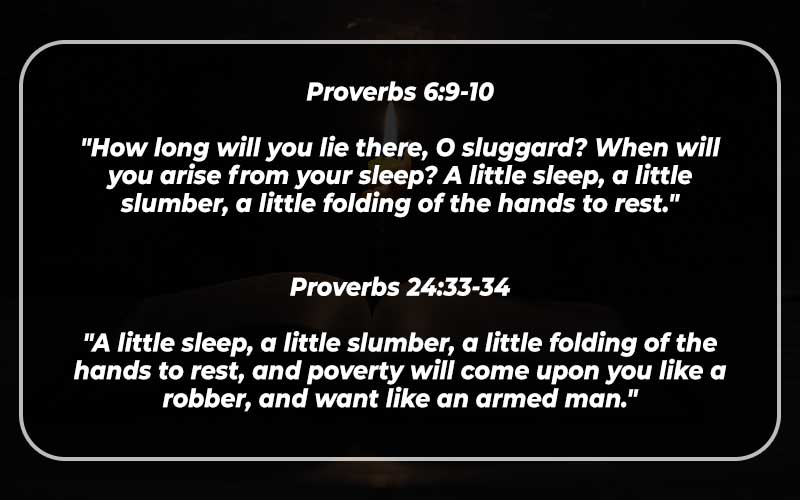In the Bible, the attitude toward sleep is often portrayed with wisdom and discernment. While rest is a gift from God, there are warnings against excessive love for sleep that can lead to laziness and neglect of responsibilities.
In this compilation, we explore 30 “He Who Loves to Sleep” Bible verses, accompanied by commentary, shedding light on the balanced perspective the Scriptures provide regarding the need for rest and the dangers of slothfulness.
He Who Loves To Sleep Bible Verse
Proverbs 6:9-10
“How long will you lie there, O sluggard? When will you arise from your sleep? A little sleep, a little slumber, a little folding of the hands to rest.”
The call to wake from excessive sleep emphasizes the danger of slothfulness and the need for diligence in fulfilling one’s responsibilities.
Proverbs 20:13
“Love not sleep, lest you come to poverty; open your eyes, and you will have plenty of bread.”
The warning against excessive love for sleep connects diligence with prosperity, cautioning against the consequences of neglecting one’s work.
Proverbs 24:33-34
“A little sleep, a little slumber, a little folding of the hands to rest, and poverty will come upon you like a robber, and want like an armed man.”
The repeated refrain highlights the swift and unforeseen consequences of laziness, symbolized by poverty and need.
Proverbs 26:14
“As a door turns on its hinges, so does a sluggard on his bed.”
The imagery portrays the lack of purpose and direction in the life of a lazy person who turns aimlessly in bed.
Proverbs 19:15
“Slothfulness casts into a deep sleep, and an idle person will suffer hunger.”
The connection between slothfulness, deep sleep, and hunger emphasizes the link between laziness and the negative outcomes it brings.
Proverbs 10:5
“He who gathers in summer is a prudent son, but he who sleeps in harvest is a son who brings shame.”
The contrast between diligence in the harvest season and shame associated with sleep highlights the importance of seizing opportunities for work.
Proverbs 26:15
“The sluggard buries his hand in the dish; it wears him out to bring it back to his mouth.”
The absurdity of the sluggard’s laziness is illustrated, emphasizing the self-destructive nature of indolence.
Proverbs 15:19
“The way of a sluggard is like a hedge of thorns, but the path of the upright is a level highway.”
The contrast between the sluggard’s difficult path and the upright person’s smooth journey underscores the consequences of laziness.
Proverbs 13:4
“The soul of the sluggard craves and gets nothing, while the soul of the diligent is richly supplied.”
The unfulfilled desires of the sluggard stand in stark contrast to the abundance enjoyed by the diligent.
Proverbs 24:30-34
“I passed by the field of a sluggard, by the vineyard of a man lacking sense, and behold, it was all overgrown with thorns; the ground was covered with nettles, and its stone wall was broken down. Then I saw and considered it; I looked and received instruction. A little sleep, a little slumber, a little folding of the hands to rest, and poverty will come upon you like a robber, and want like an armed man.”
The visual depiction of a neglected field and vineyard serves as a vivid lesson on the consequences of laziness.
Ecclesiastes 10:18
“Through sloth the roof sinks in, and through indolence, the house leaks.”
The metaphorical image of a collapsing house due to neglect warns against the destructive impact of laziness.
Proverbs 12:27
“Whoever is slothful will not roast his game, but the diligent man will get precious wealth.”
The contrast between the slothful person unable to enjoy the fruits of his labor and the diligent one acquiring precious wealth underscores the rewards of hard work.
Proverbs 15:19
“The way of a sluggard is like a hedge of thorns, but the path of the upright is a level highway.”
The thorny path of the sluggard symbolizes the difficulties that laziness introduces into one’s life, contrasting with the smooth path of the upright.

Proverbs 14:23
“In all toil, there is profit, but mere talk tends only to poverty.”
The connection between diligent work and profit contrasts with the emptiness of mere talk that leads to poverty.
Proverbs 19:24
“The sluggard buries his hand in the dish and will not even bring it back to his mouth.”
The comical image emphasizes the extreme laziness that prevents the sluggard from even feeding himself.
Proverbs 6:6-11
“Go to the ant, O sluggard; consider her ways, and be wise. Without having any chief, officer, or ruler, she prepares her bread in summer and gathers her food in harvest. How long will you lie there, O sluggard? When will you arise from your sleep? A little sleep, a little slumber, a little folding of the hands to rest, and poverty will come upon you like a robber, and want like an armed man.”
The comparison with the ant’s industrious habits serves as a call to wisdom, contrasting with the imminent consequences of the sluggard’s laziness.
Proverbs 21:25-26
“The desire of the sluggard kills him, for his hands refuse to labor. All day long, he craves and craves, but the righteous gives and does not hold back.”
The self-destructive nature of the sluggard’s desires is contrasted with the generosity and productivity of the righteous.
Proverbs 26:16
“The sluggard is wiser in his own eyes than seven men who can answer sensibly.”
The misguided self-perception of the sluggard’s wisdom contrasts with the practical wisdom of seven sensible individuals.
Proverbs 14:30
“A tranquil heart gives life to the flesh, but envy makes the bones rot.”
The emphasis on a tranquil heart bringing life contrasts with the negative impact of envy, which can be associated with laziness.
Proverbs 12:11
“Whoever works his land will have plenty of bread, but he who follows worthless pursuits lacks sense.”
The connection between diligent work and abundance contrasts with the senselessness of pursuing worthless activities.
Proverbs 13:19
“A desire fulfilled is sweet to the soul, but to turn away from evil is an abomination to fools.”
The sweetness of a fulfilled desire contrasts with the foolishness of those who turn away from what is good and productive.
Proverbs 20:4
“The sluggard does not plow in the autumn; he will seek at harvest and have nothing.”
The neglect of plowing in the appropriate season results in lack during harvest, illustrating the consequences of procrastination.
Proverbs 10:4
“A slack hand causes poverty, but the hand of the diligent makes rich.”
The causative link between a slack hand and poverty contrasts with the enriching outcome of diligence.
Proverbs 21:17
“Whoever loves pleasure will be a poor man; he who loves wine and oil will not be rich.”
The warning against excessive love for pleasure and luxury, leading to poverty, emphasizes the importance of responsible living.
Proverbs 18:9
“Whoever is slack in his work is a brother to him who destroys.”
The comparison between the slack worker and the one who destroys highlights the negative impact of laziness on productivity.
Proverbs 23:21
“For the drunkard and the glutton will come to poverty, and slumber will clothe them with rags.”
The connection between indulgence in excess and poverty, coupled with the imagery of slumber leading to destitution, underscores the dangers of overindulgence.
Proverbs 15:16
“Better is a little with the fear of the Lord than great treasure and trouble with it.”
The preference for a modest life with the fear of the Lord contrasts with the troubles that can accompany great but ill-gotten wealth.
Proverbs 23:29-30
“Who has woe? Who has sorrow? Who has strife? Who has complaining? Who has wounds without cause? Who has redness of eyes? Those who tarry long over wine; those who go to try mixed wine.”
The list of woes associated with excessive indulgence, including prolonged sleep and redness of eyes, serves as a cautionary warning.
Proverbs 24:27
“Prepare your work outside; get everything ready for yourself in the field, and after that build your house.”
The prioritization of preparation and work before building a house underscores the wisdom of establishing a strong foundation through diligence.
Proverbs 23:21
“For the drunkard and the glutton will come to poverty, and slumber will clothe them with rags.”
The repetition of the warning against drunkenness, gluttony, and the destitution associated with slumber reinforces the significance of responsible living.
Also Read: You Are Mine Bible Verse (With Commentary)

